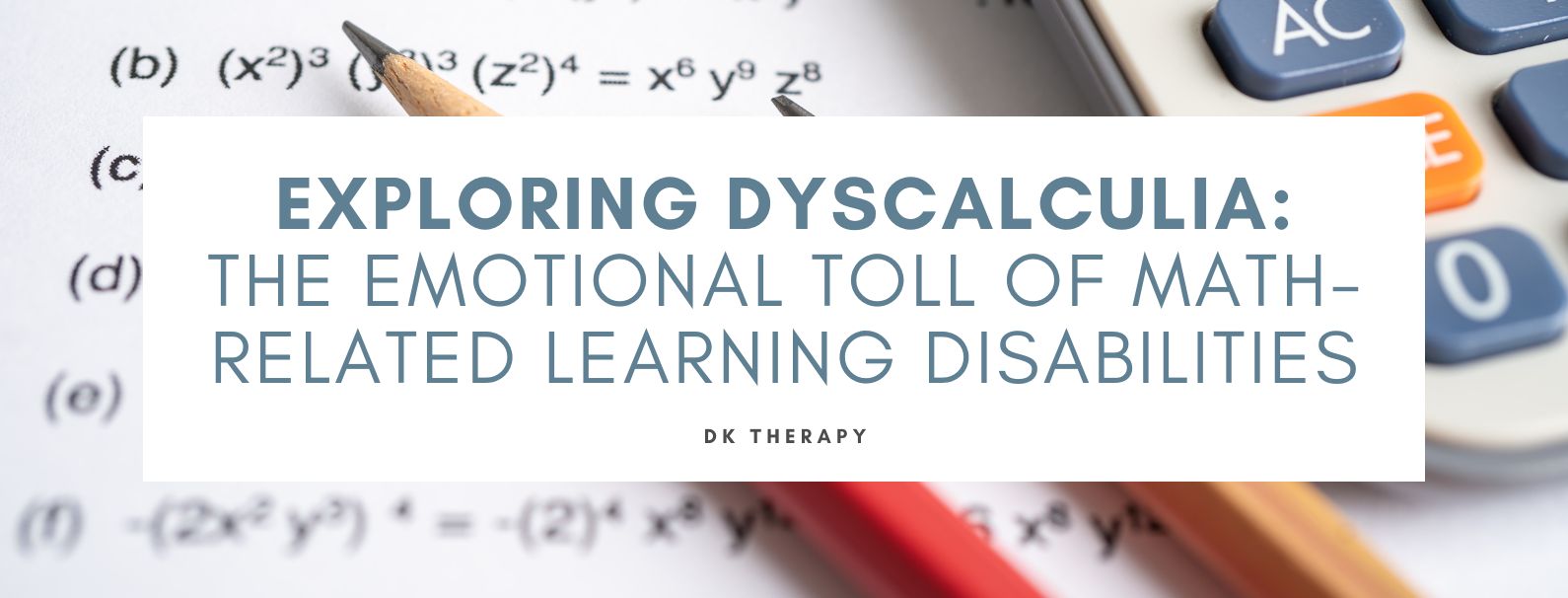
Mathematics is a fundamental skill in many professions, and we need at least the basics to function in daily life. However, for individuals with dyscalculia, math isn’t just challenging, it’s both overwhelming and anxiety-inducing.
Dyscalculia is a learning disability that affects a person’s ability to understand numbers, grasp mathematical concepts, and perform calculations. Its cognitive effects are widely discussed, but the emotional toll it takes on individuals is just as important.
Understanding Dyscalculia
 Dyscalculia is sometimes referred to as “math dyslexia,” though it’s not quite the same as dyslexia. People with dyscalculia struggle with number sense, sequencing, spatial reasoning, and recalling math facts. They often experience extreme difficulty despite being intelligent and making efforts to learn how to handle money, tell time, or understand measurements.
Dyscalculia is sometimes referred to as “math dyslexia,” though it’s not quite the same as dyslexia. People with dyscalculia struggle with number sense, sequencing, spatial reasoning, and recalling math facts. They often experience extreme difficulty despite being intelligent and making efforts to learn how to handle money, tell time, or understand measurements.
Unlike general math anxiety, which can be improved upon with practice and confidence, dyscalculia is a neurological condition that does not go away with time. Without proper support, individuals with dyscalculia may experience a range of emotional and psychological setbacks as a result.
The Emotional Impact of Dyscalculia
Struggling to understand numbers affects more than just a person’s academic performance. The constant challenges associated with failing to grasp numbers can lead to emotional issues as well. These include:
Low Self-Esteem
Many students with dyscalculia struggle to keep up in math class, which may lead to repeated failures and negative feedback from teachers, parents, and peers. Over time, this can destroy their self-esteem and make them feel unintelligent or incapable, even if they excel in other areas.
Math Anxiety and Fear of Failure
Dyscalculia often leads to extreme math anxiety. Even the sight of numbers can trigger feelings of panic, avoidance, or stress. Since math is a core subject in school, children with dyscalculia dread lessons, tests, and homework assignments.
Frustration and Helplessness
Long-term struggles with math can cause individuals to develop learned helplessness, a belief that no matter how hard they try, they will always fail. This can lead to disengagement, where they stop trying, as they assume that math is simply beyond their abilities.
Social Challenges and Shame
Struggling with basic math can make everyday interactions stressful. A child may feel embarrassed when they can’t calculate change at a store, or an adult may avoid social situations where math-related tasks (such as splitting a bill) will come up.
Academic and Career Limitations
Dyscalculia can affect academic performance beyond math class. Physics, economics, and even music (where counting and patterns are involved) may also be incredibly difficult.
Many careers require at least some level of mathematical proficiency, which makes job choices feel limited.
Coping Strategies and Support for Dyscalculia
While dyscalculia does not go away with time, treatment and the right support can make life a lot easier for people living with this disorder. For example:
Early Diagnosis and Intervention
Recognizing dyscalculia early can help individuals receive the support they need before they fall too far behind in school. Specialized assessments by educational psychologists can confirm the condition, which will lead to accommodations being made.
Alternative Learning Approaches
Multi-sensory learning, visual aids, and hands-on activities can help individuals with dyscalculia grasp mathematical concepts in ways that make sense to them. Using technology, like math apps designed for learning disabilities, can also be beneficial.
Accommodations in School and Work
Students with dyscalculia can benefit from extra time on tests, access to calculators, or alternative assessment methods. In the workplace, employers can make adjustments by allowing digital tools for calculations or offering flexible roles.
Dyscalculia isn’t talked about enough, but like dyslexia, it can cause significant difficulty throughout life. By increasing awareness and providing the right support, we can help individuals with dyscalculia navigate their challenges and build self-confidence in their unique strengths.
If you’re struggling and you’d like to see what therapy can do for your well-being, please reach out to DK Therapy and schedule an appointment with our office.




